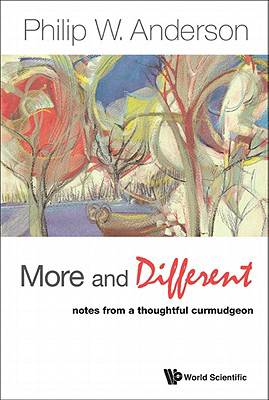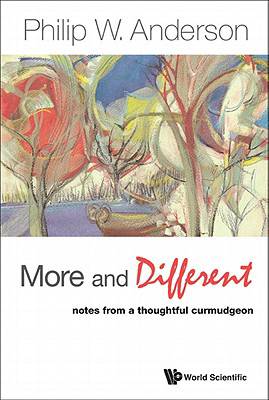
En raison d'une grêve chez bpost, votre commande pourrait être retardée. Vous avez besoin d’un livre rapidement ? Nos magasins vous accueillent à bras ouverts !
- Retrait gratuit dans votre magasin Club
- 7.000.000 titres dans notre catalogue
- Payer en toute sécurité
- Toujours un magasin près de chez vous
En raison de la grêve chez bpost, votre commande pourrait être retardée. Vous avez besoin d’un livre rapidement ? Nos magasins vous accueillent à bras ouverts !
- Retrait gratuit dans votre magasin Club
- 7.000.0000 titres dans notre catalogue
- Payer en toute sécurité
- Toujours un magasin près de chez vous
58,45 €
+ 116 points
Format
Description
Named a Top Five Book of 2012 by Physics Today, USA."Anderson has put together an entertaining and instructive collection of highly readable reviews, columns, talks, and unpublished essays on science and the scientists he has known. He is rarely inappropriately provocative, and he is a pleasure to read."Physics TodayPhilip Anderson was educated at University High School in Urbana, Illinois, at Harvard (BS 1943, PhD 1949), and further educated at Bell Laboratories, where his career (1949-1984) coincided with the greatest period of that remarkable institution. Starting in 1967, he shared his time with Cambridge University (until 1975) and then with Princeton, where he continued full time as Joseph Henry Professor until 1997. As an emeritus he remains active in research, and at press time he was involved in several scientific controversies about high profile subjects, in which his point of view, though unpopular at the moment, is likely to prevail eventually. His colleagues have made him one of the two physicists most often cited in the scientific literature, for several decades.His work is characterized by mathematical simplicity combined with conceptual depth, and by profound respect for experimental findings. He has explored areas outside his main discipline, the quantum theory of condensed matter (for which he won the 1977 Nobel Prize), on several occasions: his paper on what is now called the "Anderson-Higgs mechanism" was a main source for Peter Higgs' elucidation of the boson; a crucial insight led to work on the dynamics of neutron stars (pulsars); and his concept of the spin glass led far afield, to developments in practical computer algorithms and neural nets, and eventually to his involvement in the early years of the Santa Fe Institute and his co-leadership with Kenneth Arrow of two influential workshops on economics at that institution. His writing career started with a much-quoted article in Science titled "More is Different" in 1971; he was an occasional columnist for Physics Today in the 1980s and 1990s. He was more recently a reviewer of science and science-related books for the Times (London) Higher Education Supplement as well as an occasional contributor to Science, Nature, and other journals.
Spécifications
Parties prenantes
- Auteur(s) :
- Editeur:
Contenu
- Nombre de pages :
- 424
- Langue:
- Anglais
Caractéristiques
- EAN:
- 9789814350136
- Date de parution :
- 30-06-11
- Format:
- Livre broché
- Format numérique:
- Trade paperback (VS)
- Dimensions :
- 163 mm x 244 mm
- Poids :
- 680 g

Les avis
Nous publions uniquement les avis qui respectent les conditions requises. Consultez nos conditions pour les avis.






